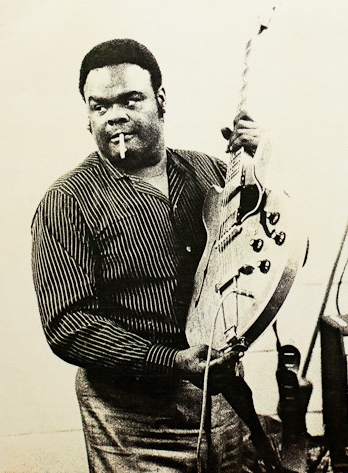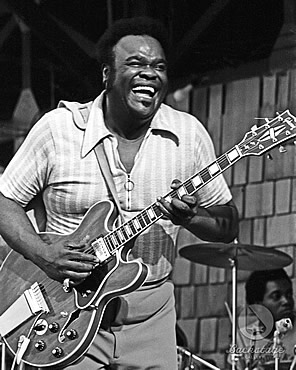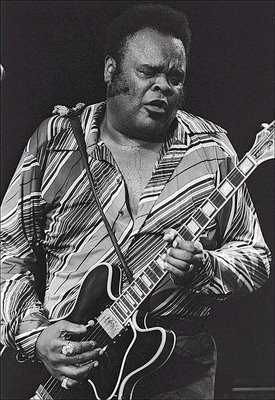<Back to Index>
- Bluesman Freddie King (Frederick Christian), 1934
PAGE SPONSOR



Freddie King (September 3, 1934 – December 28, 1976), thought to have been born as Frederick Christian, originally recording as Freddy King, and nicknamed "the Texas Cannonball", was an influential African - American blues guitarist and singer. He is often mentioned as one of "the Three Kings" of electric blues guitar, along with Albert King and B.B. King, as well as the youngest of the three.
Freddie King based his guitar style on Texas and Chicago influences and was one of the first bluesmen to have a multi - racial backing band onstage with him at live performances. He is best known for singles such as "Have You Ever Loved A Woman" (1960) and his Top 40 hit "Hide Away" (1961). He is also known for albums such as the early, instrumental packed Let's Hide Away and Dance Away with Freddy King (1961) and the later album Burglar (1974), which displayed King's mature versatility as both player and singer in a range of blues and funk styles.
King had a twenty year recording career and became established as an influential guitarist with hits for Federal Records, in the early 1960s. He inspired American musicians such as Jerry Garcia, Stevie Ray Vaughan and his brother Jimmie Vaughan and others. His influence was also felt in UK, through recordings by blues revivalists such as Eric Clapton, Peter Green, and Chicken Shack.
When King was only six, his mother Ella Mae and his uncle began teaching Freddie guitar. In autumn 1949 King and his family moved from Dallas to the South Side of Chicago. In 1952 King started working in a steel mill, the same year he married fellow Texas native Jessie Burnett, with whom he eventually had six children.
There
are significant variations and unresolved confusion over King's use of
the surname King. According to his estate, he was named "Freddy King" at
birth and his parents were Ella Mae King and J.T.Christian. According
to his sister, King had the surname Christian, even after their mother
re-married and the family moved to Chicago and that by the mid 1950s he
"Freddy Christian", was so musically ambitious that he changed his
surname to King, to ride on the coat tails of B.B. King.
It is notable that his first name is spelled "Freddy" on his recordings
made between 1956 and 1964. From 1968 his name was credited as Freddie
King.
Almost as soon as his family died he had moved to Chicago, King started sneaking into South Side nightclubs, where he heard blues performed by Muddy Waters, Howlin' Wolf, T-Bone Walker, Elmore James, and Sonny Boy Williamson. King formed his first band, the Every Hour Blues Boys, with guitarist Jimmy Lee Robinson and drummer Sonny Scott. In 1952, while employed at the steel mill, an eighteen year old King occasionally worked as a sideman with such bands as the Little Sonny Cooper Band and Earl Payton's Blues Cats. In 1953 he recorded with the latter for Parrot Records, but these recordings were never released. As the 1950s went on, King played with several of Muddy Waters's sidemen and other Chicago mainstays, including guitarists Jimmy Rogers, Robert Jr. Lockwood, Eddie Taylor, Hound Dog Taylor, bassist Willie Dixon, pianist Memphis Slim, and harpist Little Walter.
In 1956 he cut his first record as a leader, for El-Bee Records. The A-side was a duet with a Margaret Whitfield, "Country Boy,", and the B-side was a King vocal. Both tracks feature the guitar of Robert Jr. Lockwood, who during these same years was also adding rhythm backing and fills to Little Walter's records.
King was repeatedly rejected in auditions for the South Side's Chess Records,
the premier blues label, which was home to Muddy, Wolf, and Walter. The
complaint was that Freddie King sang too much like B.B. King. A newer
blues scene, lively with nightclubs and upstart record companies, was
burgeoning on the West Side, though. Bassist and producer Willie Dixon, during a late 1950s period of estrangement from Chess, had King come to Cobra Records for
a session, but the results have never been heard. Meanwhile, though,
King established himself as perhaps the biggest musical force on the
West Side. King played along with Magic Sam and supposedly did uncredited backing guitar on some of Sam's tracks for Mel London's Chief and Age labels, though King does not stand out anywhere.
In 1959 King got to know Sonny Thompson, pianist, producer, and A&R man for Cincinnati's King Records and King owner Syd Nathan signed King to the subsidiary Federal label in 1960. King recorded his debut single for the label on August 26, 1960: "Have You Ever Loved a Woman" backed with "You've Got to Love Her with a Feeling" (again as "Freddy" King). From the same recording session at the King Studios in Cincinnati, Ohio, King cut the instrumental "Hide Away," which the next year reached #5 on the R&B Charts and #29 on the Pop Singles Charts, an unprecedented accomplishment for a blues instrumental. "Hide Away" was originally released as the B-side of "I Love the Woman". "Hide Away" was King's conglomeration of a theme by Hound Dog Taylor and parts by others, such as from "The Walk" by Jimmy McCracklin and "Peter Gunn", as credited by King. The song's title comes from Mel's Hide Away Lounge, a popular blues club on the West Side of Chicago. Willie Dixon later claimed that he had recorded King doing "Hide Away" for Cobra Records in the late 1950s, but such a version has never surfaced.
After their success with "Hide Away," King and Sonny Thompson recorded thirty instrumentals, including "The Stumble," "Just Pickin'," "Sen-Sa-Shun," "Side Tracked," "San-Ho-Zay," "High Rise," and "The Sad Nite Owl". Vocal
tracks continued to be recorded throughout this period, but often the
instrumentals were marketed on their own merits as albums. During the
Federal period King toured with many of the R&B acts of the day such
as Sam Cooke, Jackie Wilson and James Brown, who performed in the same concerts.
King's contract with Federal expired in 1966, and his first overseas tour followed in 1968. King's availability was noticed by producer and saxophonist King Curtis, who had recorded a cover of "Hide Away," with Cornell Dupree on guitar in 1962. Curtis signed King to Atlantic in 1968, which resulted in two LPs, Freddie King Is a Blues Master (1969) and My Feeling for the Blues (1970), produced by Curtis for the Atlantic subsidiary Cotillion Records.
In 1969 King hired Jack Calmes as his manager , who secured him an appearance at the 1969 Texas Pop Festival, alongside Led Zeppelin and others, and this led to King's being signed to Leon Russell's new label, Shelter Records. The company treated King as an important artist, flying him to Chicago to the former Chess studios for the recording of Getting Ready and gave him a backing line-up of top session musicians, including rock pianist Leon Russell. Three albums were made during this period, including blues classics and new songs written by Russell and Don Nix.
King performed alongside the big rock acts of the day, such as Eric Clapton and for a young, mainly white audience, before signing to RSO. In 1974 he recorded Burglar, for which Tom Dowd produced the track "Sugar Sweet" at Criteria Studios in Miami, with guitarists Clapton and slide guitarist George Terry, drummer Jamie Oldaker and bassist Carl Radle. Mike Vernon produced all the other tracks. Vernon also produced a second album Larger than Life with King, for the same label. Vernon brought in other notable musicians for both albums such as Bobby Tench of The Jeff Beck Group, to complement King.
King had an intuitive style, often creating guitar parts with vocal nuances. He achieved this by using the open string sound associated with Texas blues and the raw, screaming tones of West Side Chicago blues. In his early career he played a gold top Gibson Les Paul with P-90 pickups through a Gibson GA-40 amplifier, later moving on to Gibson ES-345 guitars, using a plastic thumb pick and a metal index finger pick to achieve an aggressive finger attack, a style he learned from Jimmy Rogers. He had a relatively more aggressive and creative style of improvisation than others such as B.B King and Albert King, considered by many to be a more exploratory and less traditional approach.
King's
later years (after 1970) were marked by a shift towards more of a hard,
rock like style, presumably in an effort to reach white audiences
better. He also largely quit performing new material in lieu of simply covering songs from B.B. King and other blues musicians.
Near constant touring took its toll on King (he was on the road almost 300 days out of the year), and in 1976 he began suffering stomach ulcers. His health quickly deteriorated and he died on December 28 of complications from that and acute pancreatitis at the age of 42.
According to those that knew him, King's untimely death was due to both stress and poor diet (he was in the habit of consuming Bloody Marys in lieu of solid food so as not to waste time when setting up shows).
In 1993 by proclamation from the Texas Governor Ann Richards September 3, 1993, was declared Freddie King Day. This is an honor reserved for Lone Star legends, e.g. Bob Wills and Buddy Holly.
In 2003 King was placed 25th in Rolling Stone's list of the 100 greatest guitarists of all time.
King will be inducted as an early influence into the Rock and Roll Hall of Fame in 2012.